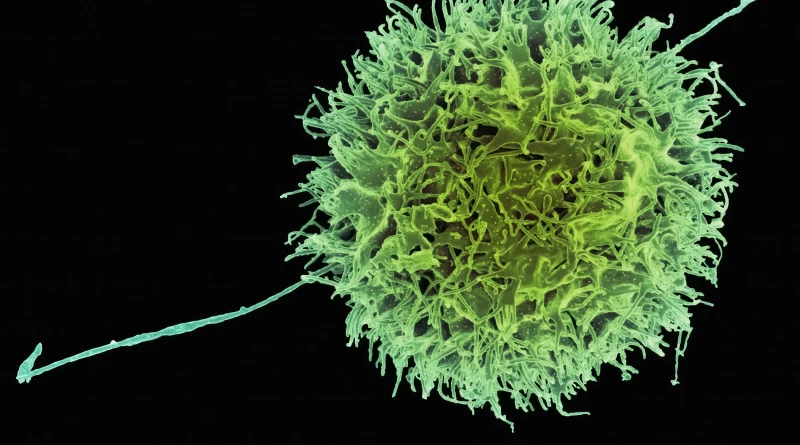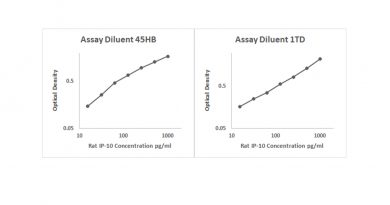3-D Life Hydrogel Used in Novel Microfluidic Platform to Investigate CAR-T Cell Therapy for Solid Tumors
Cellendes GmbH is pleased to announce that its pioneering 3-D Life Hydrogel has been successfully utilised in a novel microfluidic platform to assess the applicability of CAR-T cell-mediated therapeutic treatments. This research is detailed in the recent publication, “Breast cancer-on-chip for patient-specific efficacy and safety testing of CAR-T cells” by Maulana et al. (2024) in Cell Stem Cell.
The study, led by Tengku Ibrahim Maulana and a team of researchers from Eberhard Karls University-Tübingen, Leiden University Medical Center, Universitätsklinikum Würzburg and the Fraunhofer-Institut für Zelltherapie und Immunologie, marks a significant advancement in cancer research, particularly in the treatment of solid tumours. Utilising the 3-D Life Dextran-CD Hydrogel SG developed by Cellendes, human breast cancer cells were embedded in a novel microfluidic system, enabling researchers to explore the interactions between CAR-T cells and tumour cells in a controlled and physiologically relevant environment.
Advancements in CAR-T Cell Therapy Assessment Using 3-D Life Hydrogel
The study revealed several key advancements in the assessment of CAR-T cell therapy using the 3-D Life Hydrogel. CAR-T cells were observed to effectively migrate into the tumour cell aggregates embedded in the hydrogel, demonstrating their ability to penetrate solid tumour structures. This was accompanied by dynamic cytokine monitoring, which allowed for real-time observation of cytokine release, providing valuable data on the immune response triggered by CAR-T cells. Additionally, the use of patient-derived organoids enabled a personalised assessment of CAR-T cell therapy efficacy, highlighting the model’s potential for personalised treatment strategies. These findings underscore the innovative application of the hydrogel in developing effective and individualised cancer therapies.
3-D Life Hydrogel Used to Create a Tumor-on-chip Model
The study employed the 3-D Life Hydrogel to create a tumour-on-chip model that accurately recapitulates the 3D microenvironment of human tumours. This system includes vasculature-like perfusion channels that mimic the natural blood flow in tissues, providing a realistic setting for CAR-T cell infusion, recruitment, and infiltration into solid tumours.
Tumour Infiltration and Cytokine Release
The research demonstrated that CAR-T cells could effectively migrate into the hydrogel matrix towards the embedded tumour cell aggregates. This migration was accompanied by measurable cytokine release, crucial for assessing the therapeutic impact and potential side effects of the treatment.
Cytokine Release Syndrome Mitigation
The study also showcased how this innovative chip-based hydrogel cell culture system could be employed to evaluate treatments aimed at mitigating Cytokine Release Syndrome (CRS), a common and severe side effect of CAR-T cell therapy.
Methodology of the 3-D Life Dextran-CD Hydrogel SG in the Study
The types of cells used in this study included the MDA-MB-231 human breast cancer cell line, primary human fibroblasts, patient-derived human breast cancer organoids, and human T cells, including CAR-T cells. The methods employed included the precise injection of 3-D Life Hydrogel into microchannels and advanced fluorescence microscopy techniques to monitor cell behaviour and interactions.
The 3-D Life Dextran-CD Hydrogel SG (G93-1), supplemented with 3-D Life RGD Peptide (09-P-001) by Cellendes GmbH at a final concentration of 0.5 mmol/L, was utilised to support the embedding of tumour aggregates and spheroids. The hydrogel provides a three-dimensional scaffold that closely mimics the extracellular matrix, enabling realistic cell interactions and behaviour.
After sterilisation and hydrophilisation of the microfluidic chips with O2-plasma, the channels were flushed with 70% ethanol followed by rinsing three times with PBS. The chips were kept at room temperature until cell seeding. Previously formed MDA-MB-231 aggregates and fibroblast spheroids were resuspended in the dextran hydrogel.
The cell-laden hydrogel was precisely injected into the microchannels, and advanced fluorescence microscopy was employed to monitor the behaviour and interactions of the cells. The system allowed for the dynamic monitoring of cytokine release over more than a week, providing crucial data on immune responses and potential side effects.

Cellendes is proud to contribute to this innovative research that not only enhances researchers’ understanding of CAR-T cell therapy but also brings us closer to effective and personalised treatments for patients with solid tumours.
About Cellendes GmbH
Cellendes GmbH is a leading biotechnology company specialising in the development and production of high-quality hydrogels for three-dimensional cell culture. The company’s 3-D Life Hydrogel products are designed to provide researchers with versatile and reliable tools for a wide range of cell biology applications, including cancer research, tissue engineering, and regenerative medicine.
For more information and other advancements using 3-D Life Hydrogels, please contact Cellendes via the Quick Contact Form or email: info@cellendes.com
Original Source: Article: Maulana et al., Breast cancer-on-chip for patient-specific efficacy and safety testing of CAR-T cells, Cell Stem Cell (2024), https://doi.org/10.1016/j.stem.2024.04.018.
Cell Stem Cell 31, 1–14, July 5, 2024 ª 2024 The Authors. Published by Elsevier Inc.
This is an open access article under the CC BY license (http://creativecommons.org/licenses/by/4.0/).
Related Products




